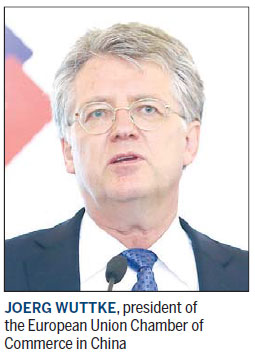European firms to invest more on reform agenda

Anti-corruption efforts applauded, but survey says implementation remains a concern
Most European companies in China would increase their investment if they could see the reforms introduced by the government were being better implemented, according to new analysis.
However, companies' expectations for the anti-corruption campaign have been exceeded, says the European Chamber's annual Business Confidence Survey 2016, released on June 7.
The survey, produced in cooperation with Roland Berger, says about 47 percent of European businesses would expand operations in China this year and that 55 percent would increase investment if reforms were better implemented.
Despite slowing and L-shaped growth, the economy could be powered for another two or three decades of high-quality expansion by measures, such as further pruning overcapacity, supply-side transformation and strengthening innovation, says Roland Berger CEO Charles-Edouard Bouee.
But for Joerg Wuttke, president of the European Union Chamber of Commerce in China, the country is performing below its potential - and there is a lot of potential.

The report states that 41 percent of European companies are re-evaluating their China operations and planning to cut costs, including through headcount reduction, while 56 percent of respondents report that doing business in China has become more difficult, a five-point increase from 2015.
Seventy percent of respondents did not feel more welcome in China than they did 10 years ago, while just 72 percent of European companies are willing to invest in research and development in China, a decline from 85 percent in 2015.
The survey was based on responses from 506 European companies in China, of which half are small or medium-sized companies.
For the past few years, the government has launched reforms in many sectors, such as in state-owned enterprise, building free trade zones and supply-side reform. It has also vowed to provide a more open and competitive market for foreign companies.
Wuttke says of all these reforms, the crackdown on corruption has exceeded expectations for European companies, but other reforms such as SOE reform and the development of intellectual property rights protection have been below expectations, although he acknowledges that China has made great efforts.
European companies still think China's progress in reforms is not fast enough, which has triggered pessimism. Although there's no departure on a major scale of European business, China is becoming less interesting for new additional investment, he says.
"We need robust investment agreements; we need milestones," Wuttke says. "We need time frames to get interested again because 55 percent of our members are very keen on investing more if they can see the reforms are being implemented. There's a strong belief that if the reforms have been outlined, it will make a major positive difference."
Xu Hongcai, director of the economic research department at the China Center for International Economic Exchanges, says China is undergoing a economic slowdown and transformation, and it is tackling the problems of overcapacity, so European companies might need time to adapt to this situation. But they should see China has taken many measures in the past two years to reform and open up and the pace will speed up.
Moreover, he says, there are still huge opportunities in China for Western companies; the key is for them to do more field research in different regions and industries, so as to find out the specific demands in different regions and industries and find opportunities for themselves. For example, in China's urbanization process and the development of green industries, Europe's technology, capital and management experience are all greatly needed.
Denis Depoux, vice-president of Roland Berger Strategy Consultants for Asia, says many European companies have seen a lot of opportunities cooperating with Chinese companies, and there are many cases of cooperation even in third markets, such as Africa, the Middle East, and countries along the Belt and Road Initiative.
Another sector for European companies to help China achieve modernization is under the Made in China 2025 strategy.
He says European companies are willing to contribute to the modernization of the Chinese manufacturing footprint, both domestically and internationally.
"China for these (European) companies is a very exciting implementation ground for connected manufacturing facilities, and retail market, which is far more connected than most European countries," he says.
"If there's one country where some of the European technology providers can experiment on-demand manufacturing with a fully connected manufacturing supply chain and then the retail market, it is China."
Wuttke says the China-EU bilateral investment treaty, which is still in negotiation, would be integral to improving the business environment and reducing barriers to market access.
"European companies now need a road map. This will give them the confidence they need to commit more to China's future development in these economically challenging times."
chenyingqun@chinadaily.com.cn
(China Daily European Weekly 06/10/2016 page29)
Today's Top News
- Takaichi must stop rubbing salt in wounds, retract Taiwan remarks
- Millions vie for civil service jobs
- Chinese landmark trade corridor handles over 5m TEUs
- China holds first national civil service exam since raising eligibility age cap
- Xi's article on CPC self-reform to be published
- Xi stresses improving long-term mechanisms for cyberspace governance






























